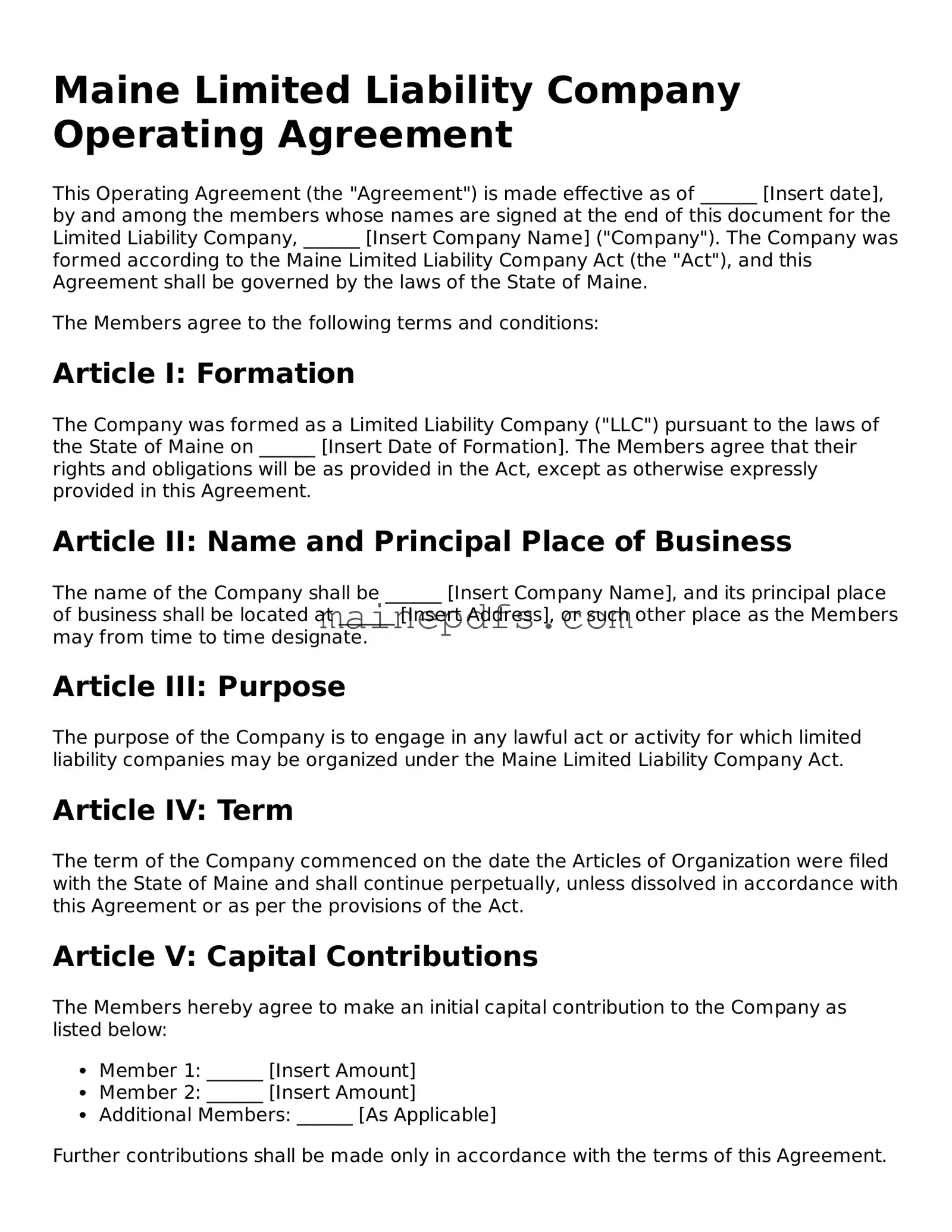Maine Limited Liability Company Operating Agreement
This Operating Agreement (the "Agreement") is made effective as of ______ [Insert date], by and among the members whose names are signed at the end of this document for the Limited Liability Company, ______ [Insert Company Name] ("Company"). The Company was formed according to the Maine Limited Liability Company Act (the "Act"), and this Agreement shall be governed by the laws of the State of Maine.
The Members agree to the following terms and conditions:
Article I: Formation
The Company was formed as a Limited Liability Company ("LLC") pursuant to the laws of the State of Maine on ______ [Insert Date of Formation]. The Members agree that their rights and obligations will be as provided in the Act, except as otherwise expressly provided in this Agreement.
Article II: Name and Principal Place of Business
The name of the Company shall be ______ [Insert Company Name], and its principal place of business shall be located at ______ [Insert Address], or such other place as the Members may from time to time designate.
Article III: Purpose
The purpose of the Company is to engage in any lawful act or activity for which limited liability companies may be organized under the Maine Limited Liability Company Act.
Article IV: Term
The term of the Company commenced on the date the Articles of Organization were filed with the State of Maine and shall continue perpetually, unless dissolved in accordance with this Agreement or as per the provisions of the Act.
Article V: Capital Contributions
The Members hereby agree to make an initial capital contribution to the Company as listed below:
- Member 1: ______ [Insert Amount]
- Member 2: ______ [Insert Amount]
- Additional Members: ______ [As Applicable]
Further contributions shall be made only in accordance with the terms of this Agreement.
Article VI: Distribution of Profits and Losses
Profits and losses shall be allocated among the Members in proportion to their respective shares of ownership in the Company, as described in this Agreement, unless different allocations are agreed upon by all Members in writing.
Article VII: Management
The Company shall be managed by its Members. Each Member shall have authority and control over the business affairs of the Company in proportion to their ownership interest. Specific roles and responsibilities of each Member, including any appointed managers, will be further defined by mutual consent of the Members in a separate management agreement, should such an agreement become necessary.
Article VIII: Meetings
Meetings of the Members shall be held annually or more frequently if deemed necessary by the Members. Notice of meetings shall be given in a manner agreed upon by the Members, not less than ______ [Insert Number] days prior to the meeting.
Article IX: Amendments
This Agreement may be amended only by the written consent of all the Members.
Article X: Dissolution
The Company may be dissolved at any time with the consent of all the Members, in accordance with the Act, or upon the occurrence of any other events as defined in this Agreement. Upon dissolution, the assets of the Company shall be distributed first to pay off any debts, and then to the Members in a manner consistent with their ownership interests in the Company.
Signatures
In witness whereof, the undersigned have executed this Operating Agreement as of the effective date first above written.
Member 1: ____________________________ Date: ______
Member 2: ____________________________ Date: ______
Additional Members (if any):
____________________________ Date: ______
____________________________ Date: ______

